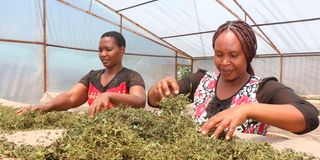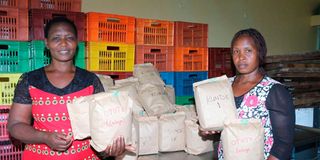
Irene Ongeri (left) and Fatuma Bosibori spreading vegetables to dry on February 3, 2025.
In the food security space, the vegetable and fruit value chain plays a vital role in empowering and creating employment opportunities for both rural and urban households.
As a result of this lucrative venture, most traders have come up with creative ways to prevent post-harvest losses and to promote the commercialisation of vegetables.
Such technologies focus on increasing the disposable income of subsistence farmers and providing good quality produce with a longer shelf life.
Among such traders is Irene Kerubo Ongeri, a subsistence farmer and agripreneur from Suneka in Kisii County.
Kerubo started out hawking fruit and vegetables door to door, a trade she learnt from her parents who were subsistence farmers.
“Selling raw farm produce was actually not a rewarding venture because farm produce is highly perishable. Also, when the market is flooded with the produce, they fetch low prices of up to Sh10 a bunch," she says.

Irene Ongeri (left) and Fatuma Bosibori holding packaged dry vegetables at a rented space offered by the Kenya Industrial Research and Development Institute, Kisii, on February 3, 2025.
She, therefore, started contemplating how to get out of the business. That was until a close friend introduced her to a group in Kisii town that was drying vegetables for export and sale in the local market.
They were drying collard greens (Sukuma wiki), spinach, bananas and kale.
She learned that the vegetables are harvested in abundance during the rainy season, value added, then packaged and stored to be used throughout the year.
They also tend to be expensive during the long dry season, which usually lasts from November to March.
In 2020, Kerubo enrolled at the Kenya Industrial Research and Development Institute (KIRDI), Kisii branch, where she was introduced to the concept of value addition.
During the training, she explored some of the cutting-edge technologies for drying vegetables in a greenhouse solar dryer.
KIRDI has also provided her with a space to dry the vegetables, which costs her Sh20 per kilo. Kerubo dries different types of vegetables every week.
She says that drying vegetables in a greenhouse is better than relying on the traditional method of exposing them directly to the sun.
Firstly, the products retain their texture, quality, nutrients and flavour.
Kerubo is involved in adding value to amaranth, African night shade (managu), collard greens (sukuma wiki), spinach, kunde, saget, pumpkin and pumpkin seeds.
The pumpkin seeds have an alternative use as they can be granulated to make composite flour.
Vegetables are sourced from Kisii, Migori, Narok and Nyamira counties, with the majority coming from Kilgoris.
When the produce arrives from the farm, it is weighed, sorted and then washed.
It is then spread out on the shelves of the greenhouse's solar dryer, where it takes between 24 and 72 hours for the vegetables to dry and be ready for packaging.
Kerubo says that vegetables in Kenya are best grown during the rainy season while prices are usually high during the dry season.
Most of her customers come from Nairobi, Nakuru, Kisumu, Kakamega and Busia counties.
Through brokers, she has also identified a market in the US and some countries in Europe, with most of her sales coming from referrals.
She also uses social media platforms such as X, Facebook and WhatsApp – to market her products.
The products are packaged in different quantities with 100 grammes of saget going for Sh350, a kilo of African night shade (managu) for Sh3,500, a kilo of kale for Sh4,000 and 100 grammes of dried bananas for Sh400.
A major challenge in the business is that it sometimes takes too long for the produce to be fully hydrated due to unpredictable weather patterns.
Fatuma Bosibori, a trader from Kisii town, started a vegetable drying business about two years ago.
Unlike Kerubo, she has not only been trained on how to dry vegetables, but also on eco-friendly ways of dealing with the waste products from bananas, which can be put to alternative uses such as weaving baskets and making carrier bags.
In her rural home in Kitutu, Kisii County, her family owned a fairly large farm that was mainly used to grow vegetables and fruit for the local market.
In a week, Fatuma dries between 250-300 kilogrammes, with a ready market in the country, while some of her produce is also sold in Europe and the US.









